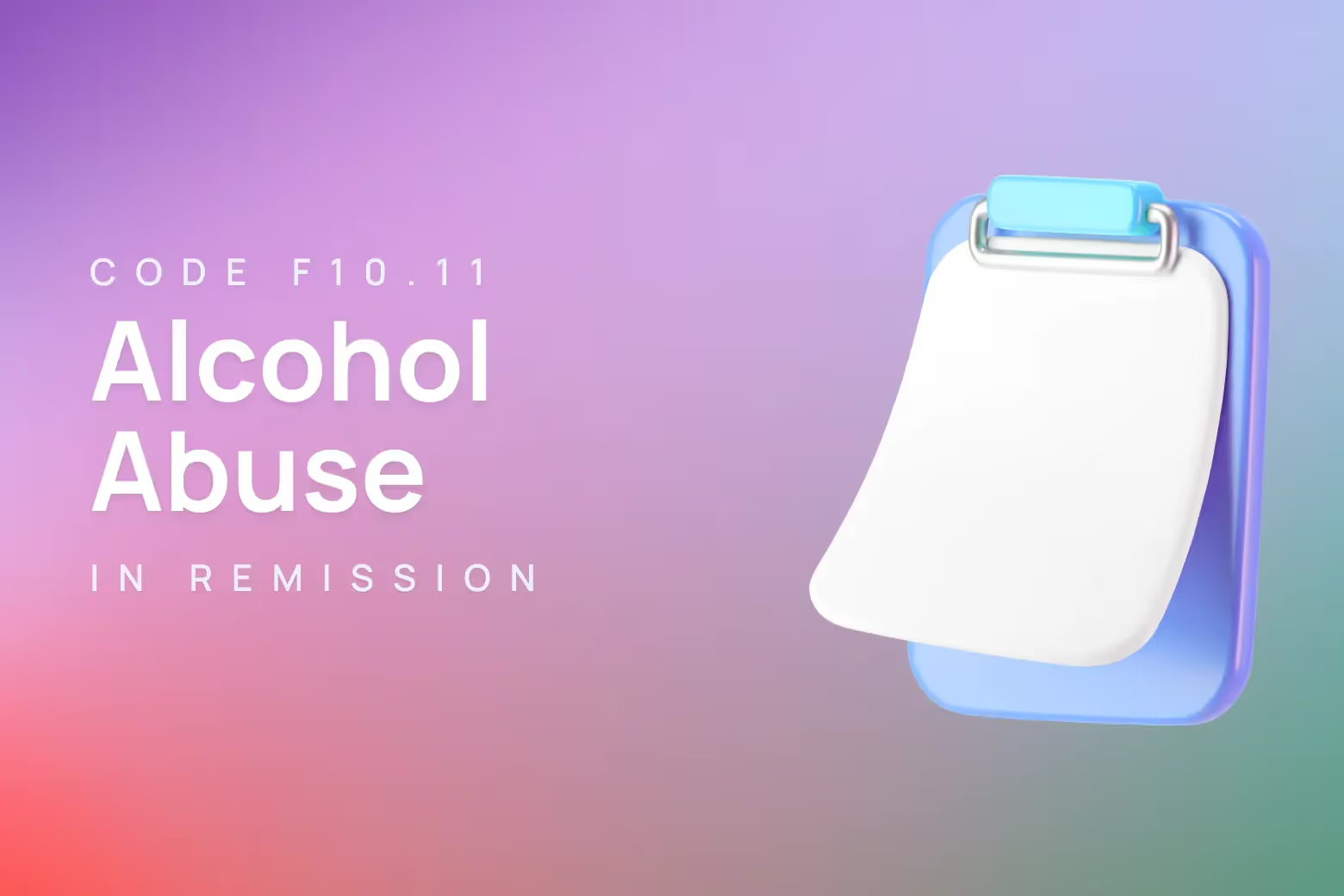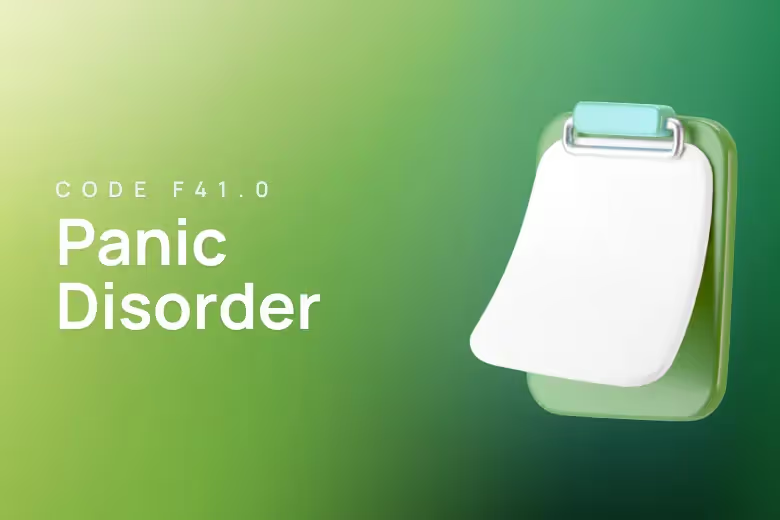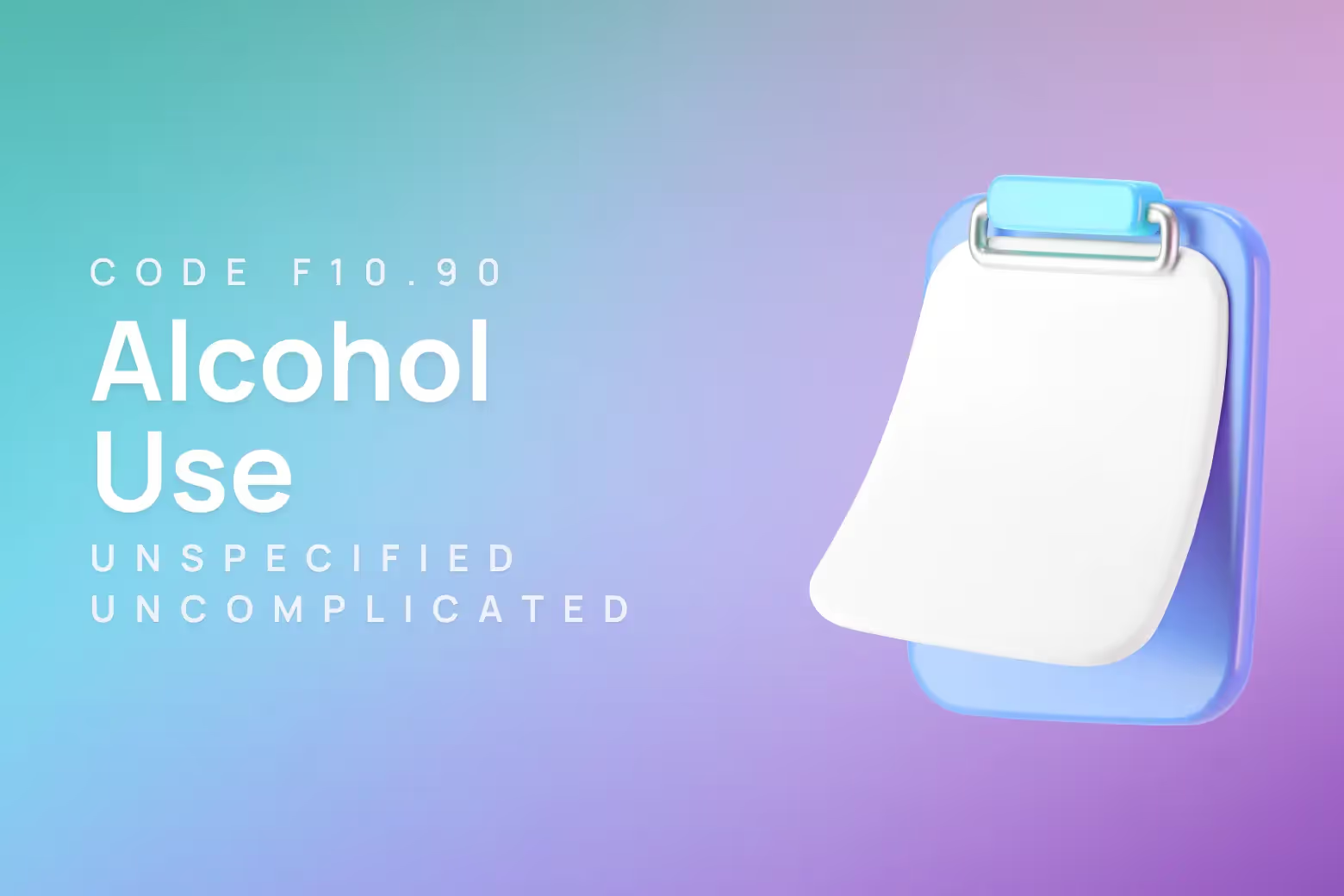ICD-10 code for alcohol abuse, in remission

F10.11 is the ICD-10 code for alcohol abuse, in remission.
This specific code indicates that a client previously met the full diagnostic criteria for alcohol abuse but currently shows no active symptoms of the disorder.
Accurate documentation of remission status helps clinicians track recovery progress and plan appropriate ongoing care.
Key features:
- F10.11 ICD-10 code applies when clients previously met alcohol abuse criteria but no longer display active symptoms
- Requires specification of early remission (3-12 months) or sustained remission (12+ months)
- Craving may still be present during remission periods
- Essential for tracking recovery milestones and treatment planning

Diagnostic criteria for alcohol abuse in remission (F10.11)
F10.11 represents a significant milestone in recovery from alcohol use disorders. This code applies when clients have transitioned from active alcohol abuse to a period of symptom-free functioning.
The remission classification requires that individuals previously fulfilled the complete diagnostic criteria for alcohol abuse.
During the remission period, none of the original alcohol abuse criteria are currently met, with one important exception - clients may still experience craving or strong urges to use alcohol.
Remission status includes two distinct timeframes:
- Early remission: Symptom-free period lasting at least three months but less than twelve months
- Sustained remission: No symptoms present for twelve months or longer
Additional specification of "in a controlled environment" applies when clients are in settings with restricted alcohol access, such as inpatient facilities or correctional institutions.
When to use F10.11 diagnosis code
Proper application of F10.11 requires careful assessment of current functioning versus historical symptoms. Clinicians must differentiate this remission code from other alcohol-related diagnoses.
F10.11 vs F10.10 (Alcohol abuse, uncomplicated)
F10.10 represents active alcohol abuse where clients currently meet two or more diagnostic criteria within a twelve-month period.
These individuals demonstrate ongoing problematic alcohol use patterns with associated impairment or distress.
In contrast, F10.11 indicates historical alcohol abuse with current symptom resolution. The key distinction lies in timing; F10.10 reflects present-day symptoms while F10.11 acknowledges past problems with current stability.
F10.11 vs F10.20 (Alcohol dependence)
F10.20 applies to more severe alcohol use disorders with four or more active symptoms.
These cases typically involve physiological features like tolerance and withdrawal alongside psychological dependence patterns.
F10.11 specifically addresses mild to moderate alcohol abuse cases that have achieved remission.
The original abuse pattern would have involved two to three symptoms rather than the more extensive criteria seen in alcohol dependence.
Related ICD-10 codes
- F10.1 - Alcohol abuse (general category)
- F10.10 - Alcohol abuse, uncomplicated
- F10.20 - Alcohol dependence
- F10.21 - Alcohol dependence, in remission
- F10.129 - Mild alcohol use disorder with alcohol intoxication
- F10.229 - Moderate to severe alcohol use disorder with alcohol intoxication
Interventions and CPT codes for alcohol abuse in remission
Supporting clients in remission requires ongoing therapeutic attention to prevent relapse and strengthen recovery skills. Evidence-based approaches help maintain symptom-free periods and address underlying factors.
Cognitive behavioral therapy
Cognitive behavioral therapy remains highly effective for clients in remission from alcohol abuse.
This approach helps individuals identify and modify dysfunctional thinking patterns that previously contributed to problematic drinking behaviors.
CBT techniques focus on developing robust coping strategies for high-risk situations. Clients learn to recognize environmental and emotional triggers while building alternative responses to alcohol cravings that may persist during remission.
Relevant CPT codes:
- 90834 - Psychotherapy, 45 minutes (individual CBT sessions)
- 90837 - Psychotherapy, 60 minutes (intensive CBT work)
- 90832 - Psychotherapy, 30 minutes (brief maintenance sessions)
Motivational interviewing
Motivational interviewing provides valuable support during remission periods by addressing ambivalence about continued sobriety.
This client-centered approach helps individuals explore their personal reasons for maintaining abstinence.
The collaborative nature of motivational interviewing makes it particularly well-suited for remission maintenance.
Clinicians work with clients to strengthen commitment to recovery goals while respecting their autonomy and decision-making capacity.
Relevant CPT codes:
- 90834 - Psychotherapy, 45 minutes (standard MI sessions)
- 90832 - Psychotherapy, 30 minutes (brief motivational check-ins)
Relapse prevention therapy
Relapse prevention represents a critical component of care for clients in alcohol abuse remission. This approach teaches specific skills for managing high-risk situations and preventing return to problematic drinking patterns.
Clients learn to identify personal warning signs and develop comprehensive action plans for maintaining sobriety.
The therapy emphasizes practical strategies for coping with urges, managing stress, and building supportive social networks.
Relevant CPT codes:
- 90834 - Psychotherapy, 45 minutes (relapse prevention sessions)
- 90853 - Group psychotherapy (relapse prevention groups)
- 90837 - Psychotherapy, 60 minutes (intensive relapse planning)
Family therapy
Family involvement often proves essential for maintaining remission from alcohol abuse.
Family therapy addresses relationship dynamics that may have contributed to drinking problems while building supportive home environments.
This intervention helps family members understand addiction recovery while teaching communication skills and boundary setting.
Addressing codependency patterns and improving family functioning supports long-term sobriety maintenance.
Relevant CPT codes:
- 90846 - Family psychotherapy (without patient present)
- 90847 - Family psychotherapy (with patient present)
How Upheal improves F10.11 ICD-10 documentation
Suggesting appropriate ICD-10 codes based on session content
Upheal's clinical documentation platform analyzes session notes to identify relevant diagnostic patterns and remission indicators.
The system recognizes language patterns that suggest clients have transitioned from active alcohol abuse to remission status.
By tracking symptom evolution over time, Upheal helps clinicians determine when F10.11 becomes the most appropriate diagnostic code.
The platform considers both historical symptoms and current functioning to suggest accurate remission classifications.
Maintaining HIPAA-compliant records with proper diagnostic coding
Proper documentation of remission status requires careful attention to timeline details and symptom tracking. Upheal supports clinicians by organizing this information within secure, HIPAA-compliant records.
The platform helps maintain accurate chronological records of symptom resolution while tracking important remission milestones. This documentation supports both clinical decision-making and billing accuracy for F10.11 cases.
Reducing administrative burden so you can focus on client care
Managing remission cases involves significant documentation requirements around symptom tracking and timeline verification.
Upheal automates much of this administrative work, allowing clinicians to focus on therapeutic interventions.
The platform streamlines progress note generation while ensuring all relevant remission criteria are properly documented.
This efficiency enables clinicians to spend more time on direct client care rather than paperwork.
Supporting clients with alcohol abuse in remission
Remission from alcohol abuse represents a significant achievement that requires ongoing clinical attention and support.
Clients in this phase of recovery benefit from continued therapeutic engagement focused on relapse prevention and lifestyle stabilization.
The transition to remission status often brings new challenges as individuals adapt to life without alcohol dependence.
Clinicians must remain vigilant for early warning signs of relapse while celebrating recovery milestones and strengthening protective factors.
Maintaining therapeutic relationships during remission helps clients develop confidence in their ability to sustain sobriety long-term.
Regular check-ins provide opportunities to address emerging stressors and reinforce coping strategies developed during active treatment phases.
Ready to improve your clinical documentation for alcohol abuse remission cases?
Try Upheal's platform free and experience how AI-powered note generation can help you provide better care while reducing administrative burden.













